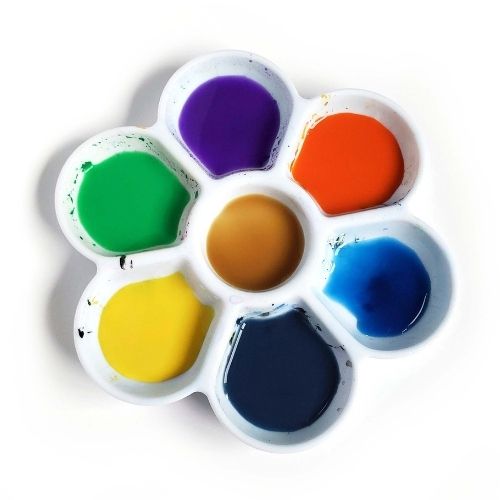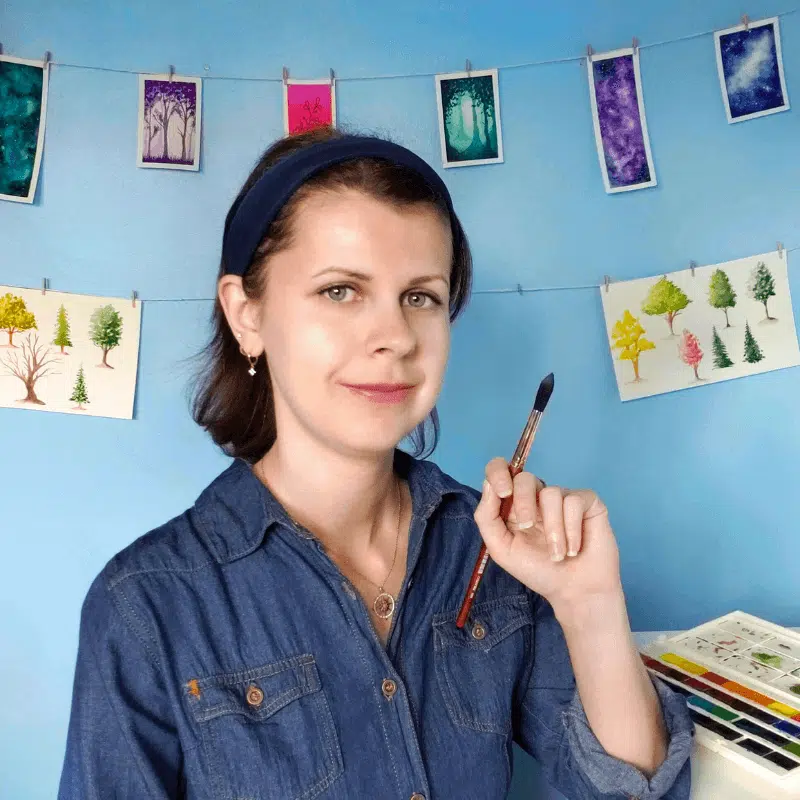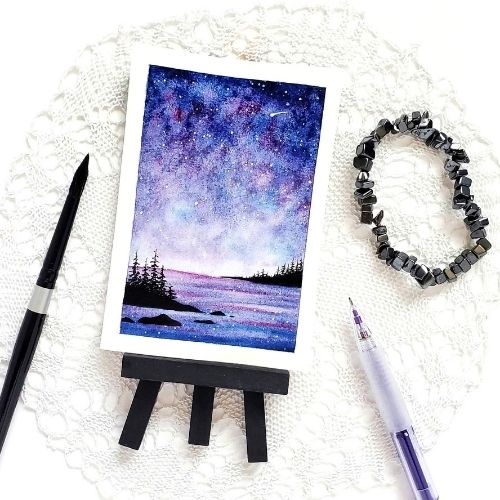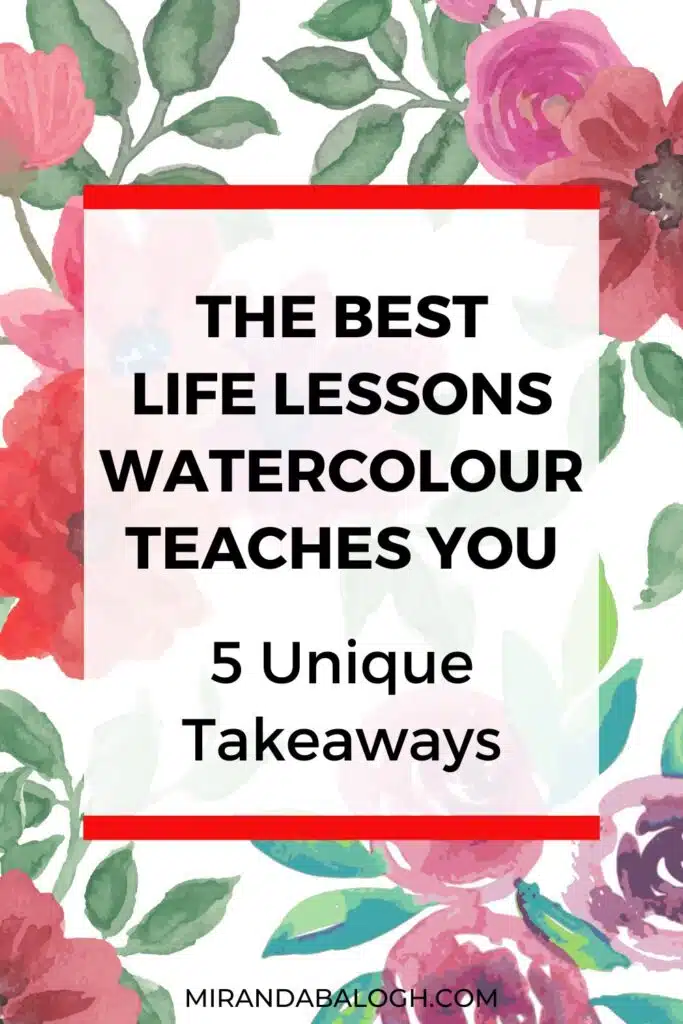Whether you’re a watercolour beginner or an experienced watercolourist, you might have discovered that there are many life lessons watercolour teaches you.
Some lessons are fairly obvious such as learning how to mix colours, layering with watercolour, mastering water control, and so on.
But in my experience, watercolour painting has taught me several important life lessons that have greatly impacted not only my art journey, but my life as a whole.
Watercolour teaches you essential life lessons such as learning to slow down and be present, letting go of perfectionism, being intentional, letting go of the need to control, and understanding that creativity is an essential part of life.
To divulge this topic further, this blog post takes the time to:
- Break down these 5 life lessons by explaining the greatest takeaways from each one
- Show you how these life lessons are transferrable to all areas of your life
- Inspire you to reflect on your watercolour journey and the lessons you’ve learned
By the time you’re done reading, you might decide to apply one or more of these life lessons to your creative process. In the best-case scenario, you’ll walk away with a greater appreciation for watercolours!
Table of Contents
1. Slow Down and Embrace the Present Moment
One of the most important life lessons watercolour teaches you is to slow down.
As I’m sure you know, many modern industrialized societies are obsessed with the endless pursuit of ever greater levels of productivity and busyness.
Many parts of the developed world are defined by a fast-paced hustle culture that never seems to slow down. In some industries, hustling is seen as a badge of honour.
For this reason, watercolour is the perfect antidote for a busy and fast-paced lifestyle because the slow and contemplative nature of this art form forces you to slow down and take your time.
As an example, it’s kind of impossible to paint quickly with watercolour because you spend a considerable amount of time waiting for the layers to dry. And good watercolour painting requires you to add multiple layers in a single painting.
So when you slow down and take your time to paint, you learn to be present with yourself. The slower and softer pace of this art form creates space for you to relax and enjoy the painting process.
As a result, one of the greatest benefits of slowing down is that you learn to develop patience. In my experience, as I’ve become more patient, I’ve felt less stressed and anxious because I experience greater levels of joy via this form of artistic self-expression.
In other words, painting with watercolours is all about enjoying the adventure and not rushing to the destination.
2. Embrace Mistakes and Let Go of Perfectionism
Another important lesson that watercolour teaches you is to embrace mistakes and let go of your perfectionistic tendencies.
I know this is easier said than done because many beginners often believe that watercolour is hard to learn due to its unpredictable and “unforgiving” nature.
The truth is that watercolour is an unpredictable art form with a mind of its own. You can’t always control the flow of water the way you want to, which can make watercolours difficult to work with.
Nevertheless, I believe putting in the effort to let go of perfectionism is well worth the time because by doing so, you learn how to accept yourself and your art.
When you learn to accept yourself, it’s easier for you to let go of self-judgement and self-criticism.
By developing self-acceptance, it becomes easier for you to accept your artwork for what it is, no matter how “good” or “bad” it might look from an aesthetic perspective. In other words, you’re learning to accept that you, as an artist, and your artwork are enough.
Another way to look at it is to understand the following acronym:
FAIL = First Attempt In Learning
Great artists such as Leonardo da Vinci, Monet, and Van Gogh didn’t become masters of their craft overnight. It took many years of practice, experimentation, and discipline to master their skills.
So be patient and gentle with yourself as you unlearn the habit of perfectionism.
In the long run, you’ll be glad that you learned to embrace your mistakes because it’ll relieve a huge amount of mental pressure. It’ll also help you over the fear of failure if you struggle with it.
Instead, reframe mistakes as fortunate opportunities for you to figure out how to paint properly. After all, if you never made mistakes, you’d never learn or progress with anything in life!
3. Be Intentional
An essential life lesson that watercolour teaches you is to be intentional with your brushstrokes, your colour mixing, and your creative choices.
In my understanding, to be intentional means that you make deliberate choices and/or you take deliberate action. To do this means you’re operating from a state of awareness.
So when you choose to be intentional with your watercolours, you approach your paintings from a greater level of self-awareness.
For example, instead of laying down hundreds of brushstrokes that can make the pigments appear streaky, you focus on laying down a few dozen so that each brushstroke is intentional and deliberate. The result is a painting that looks smooth and neat.
Another example is knowing how to layer watercolours because the techniques you apply, the amount of water you use, and the number of layers you lay down will alter the appearance of your final painting.
Painting with intentionally helps you minimize errors because the preparation and healthy mindset both set you up for greater success with your painting.
So as you learn to paint with watercolours, you’ll start to understand how approaching any activity in life with intentionality can dramatically improve your relationship to that activity.
4. Let Go of the Need to Control
One of the greatest watercolour lessons you can learn is to let go and let flow.
In other words, by painting with watercolours, you learn to let go of the need to control the outcome.
You might wonder, “How is that so?”
As we previously discussed, watercolour is an unpredictable medium with a mind of its own. The flow of water can be difficult to control, and you don’t always nail the paint-to-water ratio.
When your painting goes awry or the layers don’t turn out properly, it’s easy to fall into a pit of despair as you spiral into self-criticism and deep frustration.
When you obsess over creating the “perfect” painting (there’s that perfectionism creeping in again), you end up not appreciating the creative process because you’re too fixated on a specific outcome.
And if you don’t achieve that specific outcome, you feel disappointed, defeated, and let down.
So what’s the solution?
The solution is to let go of the need to control your watercolours. That means:
- Allowing the water to flow freely (such as when you apply the wet-on-wet technique)
- Embracing any mistakes that might appear in your painting
- Accepting your painting as it is without judgement or criticism
As a result, you build trust in yourself and in the creative process.
When you trust the creative process, it’s easier for you to get into a creative flow state. This is a state in which it’s much easier and more effortless to create art.

5. Creativity is an Essential Part of Life
Of the many life lessons watercolour teaches you, the last on this list reveals that creativity is an essential part of life.
Truth be told, any art medium or creative endeavour can teach you this life lesson. But I believe watercolour is special because of its unique characteristics.
Unlike the heaviness of pen and ink, the thickness of oil paints, and the complexity of realistic drawing, watercolour is characterized by soft and gentle traits such as luminosity, transparency, and fluidity.
For example, learning to slow down and be intentional with your watercolour paintings helps you relax and unwind from the stresses of everyday life. Painting becomes a calm and comforting activity because watercolour is a gentle medium.
Moreover, watercolour is great for your mental health because the creative act provides a safe space for you so that you can set aside your worries and stress for a while.
Lastly, painting with watercolours allows you to embrace artistic self-expression. When you reconnect with your creativity and your inner child, you’re able to foster self-intimacy by creating art that is personal, meaningful, and perhaps even therapeutic.
Conclusion
In this blog post, you’ve learned about the best life lessons watercolour teaches you and how adopting one or more of these lessons can improve not only your art practice, but your entire life.
This blog post was inspired by my personal journey with watercolours, and so my intention is to share these life lessons with you to give you support and encouragement on your own watercolour journey.
Everyone’s journey is different, so you may or may not have resonated with my lessons. Or perhaps you have learned different life lessons from me.
So now it’s your turn! I’d love to know what is the biggest life lesson that you learned from painting with watercolour? Share your experience in the comments section below!

Miranda Balogh
Artist & Online Educator







You wrote: ‘Watercolour teaches you essential life lessons such as learning to slow down and be present, letting go of perfectionism, being intentional, letting go of the need to control, and understanding that creativity is an essential part of life.’
This is so true. I’ve found watercolor painting relaxing in that it not only forces me to slow down, but I’ve learned to be more patient having to wait for layers to dry before continuing.
I relate to your experience with watercolour painting. Thanks for sharing your perspective!